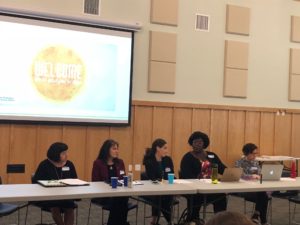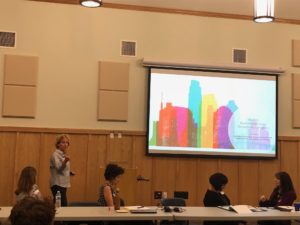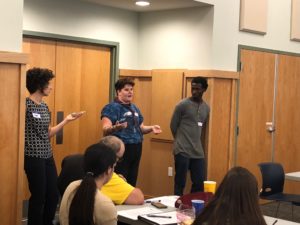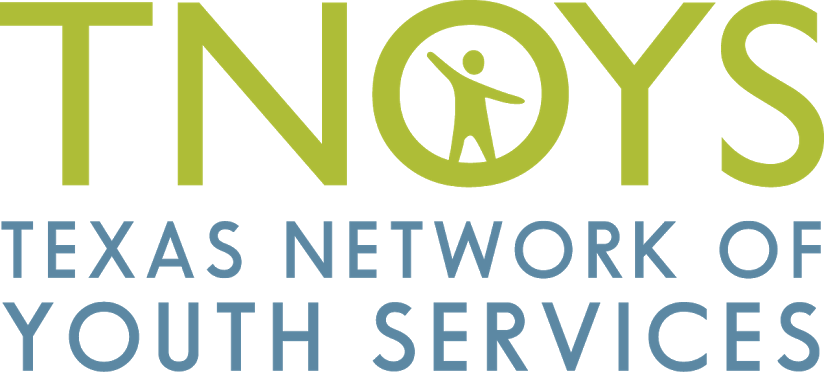 The new Statewide Workgroup on Youth Homelessness kicked off its first meeting on October 4, providing a space for state agencies, statewide organizations, and local entities to collaborate on efforts to strengthen services and supports for Texas’ homeless youth.
The new Statewide Workgroup on Youth Homelessness kicked off its first meeting on October 4, providing a space for state agencies, statewide organizations, and local entities to collaborate on efforts to strengthen services and supports for Texas’ homeless youth.
Although the Texas Interagency Council for the Homeless addresses the issue of homelessness broadly, there has not been an interagency group focused specifically on the needs of youth and young adults facing homelessness in Texas. Research has shown that youth experience homelessness differently than adults and require different types of services and supports, so TNOYS, Texas Appleseed, and the Texas Homeless Education Office joined together to form this group specifically to advance that work. Such a collaborative effort between agencies and organizations was one of the recommendations for combating youth homelessness in TNOYS’ and Texas Appleseed’s joint report on youth homelessness released last year.
Representatives attended the first meeting from nearly 30 organizations across the state, representing a variety of different systems that touch homeless youth – including education, health care, and juvenile justice. Attendees heard from one another about the work they are doing in this area to better understand each other’s systems and prevent work from being done in silos.
across the state, representing a variety of different systems that touch homeless youth – including education, health care, and juvenile justice. Attendees heard from one another about the work they are doing in this area to better understand each other’s systems and prevent work from being done in silos.
Updates included:
- The Governor’s Office Child Sex Trafficking Team provided information on their work to prevent and respond to child sex trafficking, noting that homelessness is one of the top vulnerabilities for trafficking, making it important for them to be part of this group. The team shared their focus on improving data collection and reporting and on creating alternatives to keep youth from being prosecuted when they are victims of trafficking.
- Child Protective Services shared its enhanced efforts to address the issue of youth running from foster care placements. These efforts including working to facilitate culture change within the agency and its contracted provider organizations to better understand and support youth to prevent them from running. Efforts also include wraparound meetings with youth who have run but been located and the caring adults who support them (caseworkers, CASA volunteers, etc.) to prevent future runaway incidents.
- Child Protective Services also provided an update on SB 1758, a bill passed by the Texas Legislature during the last legislative session that is one of the most comprehensive efforts to overhaul how youth in foster care are prepared for adulthood. Click here to learn more about SB 1758.
- The Texas Education Agency’s McKinney-Vento homeless education state coordinator shared that TEA is developing new resources to assist with identification of homeless students, and that the agency recently secured $8.9 million in additional funding that school districts can apply for to help support students who are on free and reduced lunch or recovering from the impact of Hurricane Harvey.
- Texas Network of Youth Services shared that our new Safety Nets for Students and Families program is up and running to provide support for youth and families along Texas’ Gulf Coast who are experiencing homelessness in the wake of Hurricane Harvey, and that the program will be providing grant funding and training and technical assistance to community organizations working to support these populations.
- Houston reVision shared that they are creating a coordinated community plan in Houston to get a better understanding of the landscape of services and what gaps exist.
- Austin ECHO shared the efforts of a group of organizations in Austin and Travis County to create a movement to end homelessness.
 Before these updates were shared, the meeting was opened with remarks and perspective from two formerly homeless youth, to underscore the importance of always incorporating youth voice into efforts to serve them. Alex Polk, who was homeless for over a year in Central Texas experienced unique challenges as an LGBTQ youth, who are 120% more likely to experience homelessness than non-LGBTQ youth.
Before these updates were shared, the meeting was opened with remarks and perspective from two formerly homeless youth, to underscore the importance of always incorporating youth voice into efforts to serve them. Alex Polk, who was homeless for over a year in Central Texas experienced unique challenges as an LGBTQ youth, who are 120% more likely to experience homelessness than non-LGBTQ youth.
And Charles Batiste, who was involved with various systems in his teens, including the foster care and juvenile justice systems, also experienced homelessness in the Houston area before receiving support from the Salvation Army there. According to Charles, some of the most pressing issues are determining the right placements for youth in foster care to ensure they have more stable housing and support and are prepared for independent adult living.
It was exciting to see such a large group of professionals coming together to focus specifically on the unique needs of youth experiencing homelessness, and encouraging to see how youth voice was incorporated into the discussion. The next meeting of the workgroup will take place on December 6 – if you are involved in work that touches youth homelessness, we encourage you to register to attend!
